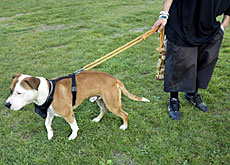Government recommends Pitbull ban

The authorities have proposed banning Pitbull terriers and tightening regulations on other dangerous dogs, six weeks after a fatal Pitbull attack on a child.
Swiss animal experts have criticised moves to ban the fighting dog and impose restrictions on 13 other breeds, saying such measures don’t always work or don’t address the real problem.
The veterinary office said on Friday it was recommending a clampdown on 13 dog breeds, including bull terriers, Rottweilers and Dobermans.
People wanting to keep one of these dogs would have to apply for extension of their licence and be able to prove the origin of the animals, said the veterinary authorities in a statement.
Pitbulls are not a recognised dog breed and are bred from other types of dogs for their aggressiveness, they said. The breeding of Pitbulls cannot be controlled, which is why a ban has been proposed.
The decision comes one month after a six-year-old boy was killed by three Pitbulls in the town of Oberglatt near Zurich.
“The fatal accident in Oberglatt has relaunched the debate on the need for more restrictive measures against dangerous dogs,” said the veterinary office.
Several cantons, including Zurich, have already tightened legislation on dangerous dogs since the incident.
The federal government has to approve the veterinary office’s proposals before they become law. It is due to look at the reforms later this month.
Dangerous breeds
Not all dog experts have welcomed the proposals. Colette Pillonel, a dog behaviour expert who has just walked out of the government’s official working group on dangerous dogs, questioned the value of drawing up lists.
“Every study that has ever been made on this topic says the same thing – every dog is dangerous. It’s lying to the public, saying that you have to be afraid of [only] these breeds,” Pillonel told swissinfo.
She said that experiments in other countries, namely Britain and Germany, had shown that breed-specific measures didn’t always produce results.
Pierre-François Gobat, the cantonal veterinary officer for Neuchâtel, also has his doubts. His canton is the only one to maintain a statistical database of dog attacks requiring medical attention.
He told swissinfo that in his canton only ten per cent of bites came from the 13 breeds listed by the Federal Veterinary Office. In only one of the 13 serious cases was a Pitbull the cause.
Sceptical
The Swiss Canine Association was also sceptical about the suggestions and said it would make more sense to target owners.
“People are the reason for dog attacks, not animals,” said the association’s president, Peter Rub.
But he added he would support the measures if they stopped more attacks like the one in Oberglatt.
For its part, the Swiss Animal Protection organisation said it feared that if the proposals became law, it might be overrun with unwanted dogs. It would be unacceptable for the problem to be passed on in this way, it said.
Europe ahead
Switzerland is not the first European country to consider such legislation. The Federation of Veterinarians of Europe (FVE) told swissinfo that several countries – including Switzerland’s neighbours Germany and France – had already taken measures against dangerous dogs.
These ranged from complete bans and behavioural tests for certain breeds, to more general measures such as compulsory muzzling.
“Measures as proposed by Switzerland… are not much tighter than those already taken by other countries,” said the FVE’s Talina Sterneberg.
The FVE believes that measures such as a ban on Pitbulls can only be effective if they are part of a broad package and that the emphasis should be on responsible ownership. Further support measures, such as identification, are also valuable, it says.
swissinfo with agencies
Apart from banning Pitbulls, the government wants to regulate 13 breeds: American Staffordshire Terrier, Staffordshire Bullterrier, Bullterrier, Dobermann, Dogo Argentino, Dogo Canario, Fila Brasileiro, Rottweiler, Mastiff, Spanish Mastiff, Neapolitan Mastiff, Tosa and Cane Corso Italiano.
Authorisation will be needed, no crossbreeding will be allowed and the animals should be sterilised.
The changes should affect around 10,000 dogs.
Swiss legislation on dangerous dogs is currently less strict than in other European nations.
In Germany, it is illegal to import or breed some types of dogs.
In France, purchasing, selling, as well as importing and breeding dangerous dogs is illegal. People who already owned one of these animals before the law became effective have to muzzle their dogs.
In Britain, a leash and a muzzle are compulsory for dogs that might be dangerous. Importing and breeding dogs such as Pitbulls is illegal, as is the case in the Netherlands.

In compliance with the JTI standards
More: SWI swissinfo.ch certified by the Journalism Trust Initiative



You can find an overview of ongoing debates with our journalists here. Please join us!
If you want to start a conversation about a topic raised in this article or want to report factual errors, email us at english@swissinfo.ch.